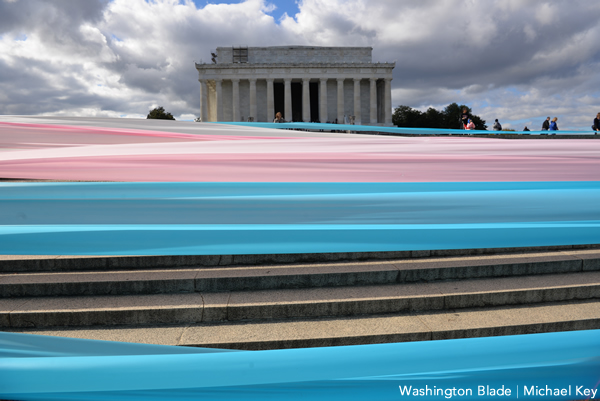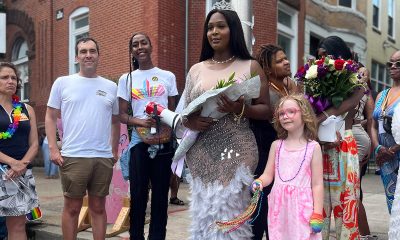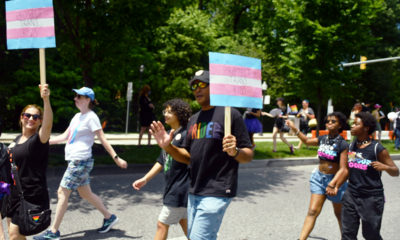Opinions
Trans ban repeal anniversary meaningless without fed’l voter protection
We all deserve to have an equal voice in our government

It has been a year since President Biden repealed the Trans Ban. Now, everyone who is qualified to serve their country in the armed forces is able to, openly and authentically. As transgender veterans ourselves, this is an action that we welcome and celebrate.
Since the ban was repealed, the Biden administration has taken initiative to expand Veterans Affairs (VA) benefits to transgender military members and veterans. In June, the secretary of VA, Dennis McDonough, announced a lift on a 20-year ban for gender confirmation surgeries, allowing the procedure to be covered under VA benefits. In September, nearing the 10th anniversary of the repeal of Don’t Ask, Don’t Tell (DADT), the VA disseminated a plan that allows LGBT veterans with other-than-honorable discharges to receive VA benefits. Already in 2022, the VA has announced that trans and nonbinary veterans can update their offical health records with the correct gender identification. While there has been a lot of forward movement in military and veterans spaces for inclusivity, our country is still fighting for a fair and inclusive democracy.
Just as it’s important to recognize transgender veterans’ rights to be openly trans and to receive healthcare through the VA, it is also important to pursue a robust voting rights agenda to eliminate racialized or politicized restrictions on the constitutionally protected right to vote. Right now, it is critical to pass federal voting rights protections. With safeguards in place in our democracy, we can elect leaders that truly care about us. No matter someone’s gender identity, race, ethnicity, or disability status, we all deserve to have an equal voice in our government. As transgender veterans, we want to share our stories and the impact that the decisions made at the federal and state level have on us.
Lene Mees de Tricht (she/her)
I am a transgender US Navy and Coast Guard veteran. Since I left the military, many things have changed, and mostly for the better. Or rather, we’re currently trending positive. And we should on no account be satisfied with our progress; trans people still face a lot of discrimination and trans veterans still face compounding difficulties, but I would like to reflect on how far we’ve come.
I served from 2002-2012, when I was discharged for being transgender. I was unprepared to be very suddenly cast into the civilian world, and I’ve spent the intervening decade trying to recover financially, emotionally, and mentally. I had to do things I’m not proud of to survive, and I’ve been dealing with the trauma of that while also trying to find a job with no marketable skills (an intelligence analyst’s most valuable asset is their clearance, and without it, you have very little to offer) in a society that felt like they were free to hate. The previous administration’s reversal of the incremental gains of the Obama administration set back transgender rights in service of empowering a small demographic of hateful people who would prefer we have no voice and no presence in their military or their society.
So while the VA’s decision to repeal the ban on gender confirmation surgery and recognize veterans as transgender is objectively an improvement, it’s also not enough. As a society, I think we acknowledge the hardships and difficulties of transgender people broadly, and the unique challenges that being a transgender veteran can impose. And I think we as a people acknowledge that being transgender is not the only axis of discrimination and hardship facing Americans even today. Trans veterans stand with our fellow Americans of color in recognizing the ongoing threats to democracy present in our society.
Albi Brunzell (they/them)
I am a nonbinary US Navy veteran who served from 2002-2005 during DADT. I was discharged before it was overturned, so I was never given the right to serve openly as a nonbinary sailor. I served as a straight female because if I didn’t, my country deemed me less worthy to fight for freedom and democracy – something that still sounds absurd to me. Liberty and Justice for all is still not a reality for so many Americans, myself included. Without equal rights, we will never have true liberty or democracy in America. The overturning of DADT made huge steps for the LGB community while transgender rights were still on the line. Up until last year, Trans service members were stuck in a political limbo, and thankfully President Biden ended that.
In the same way, we have made some progress on voting rights in the last few years. States like Michigan have leaders like Secretary of State Jocelyn Benson, who set out to improve access to ballots for veterans after her husband had issues receiving his ballot while deployed overseas.. Our country needs to pass a federal voting rights bill. It’s unconstitutional for millions of Americans to not have equal access to their ballots. Democracy only works when everyone participates.
Esti Lamonaca (they/them)
I am a trans nonbinary US Army 2014 to 2020, OEF (Operation Enduring Freedom) combat veteran. I served during Trump’s Trans Ban implementation. While I had to hide my authentic self, I continued to fulfill the responsibilities of my oath. My gender identity never meant I was unfit to serve. The Commander-in-Chief at the time endangered me in the very country I was risking my life to protect. Trump’s ban has a lasting transphobic footprint within the US military. In combat zones, gender does not matter; what matters is if you can do the job you volunteered to do.
The Biden administration repeal of the Trans Ban humanized the trans community in a space we once were considered a “burden.” Now we need protected human rights as part of our entire democracy. Our democracy isn’t for one group of people, it is for all people. Every single human being deserves to be able to participate in democracy, especially in casting their vote, and it is up to our elected officials to ensure that this is possible.
There’s nothing more patriotic than participating in democracy while being under attack by your own country, whether that is serving your country while hiding your authentic self or battling voter suppression to cast your ballot. You may not know why someone needs access to vote by mail, early vote, or who may even be scared to vote because of voter intimidation, just like you may not know someone’s gender identity who is in full combat gear deployed beside you. While something may not directly affect you, it doesn’t mean someone you love or know isn’t affected. Not everything or everyone is what they appear to be, but that doesn’t mean they should be treated less than.
Even with all of the forward movement, there is still a lot of work needed to ensure true democracy is achieved. As transgender veterans, we know what it looks like to watch democracy crumble, we know what it looks like to be restricted of our rights, and we will not be silent as the attacks on our democracy persist. We swore an oath to protect our democracy, and that oath didn’t expire. Our nation’s leaders have to represent all of us, otherwise our democracy will collapse. It is imperative that federal anti-discriminatory legislation is passed to protect all people, especially when it comes to participating in our democracy.
Members of Congress claim they support veterans every opportunity they get, but they do not support all of us when they are voting against some of our rights. It is vital that the federal government pass federal voting legislation. It is crucial to provide an equal voice in our democracy to all members of society, not just a select group. It is essential that democratic progress never reverses course again, and as veterans we will continue to fulfill our oaths and fight for progress to guarantee liberty and justice is truly for all.
Lene (she/her) is a US Navy and US Coast Guard veteran from Iowa. She served for 10 years in support of counterterrorist, counternarcotics, and humanitarian aid/disaster relief operations. She is the Veterans Organizing Institute Program Associate at the grassroots veterans organization Common Defense.
Albi (they/them) short for Amanda Le’Anne Brunzell, is a US Navy veteran from Grand Rapids, Mich. They are the first non-binary person to openly run for federal office in the United States. Currently, they are pursuing a dual degree in International Relations and Public Policy with a focus on National Security. They are an active member of Common Defense.
Esti Lamonaca (they/them) is a US Army combat veteran from New York City. They served in Afghanistan as part of a Special Forces Joint Task Force team component of NATO. They currently are the National Membership Manager of the grassroots veterans organization, Common Defense.

Joe Biden was clearly ready with some facts for this debate, the sad part is he couldn’t articulate them. He sounded raspy, and lost track of what he was saying in the first few minutes of the debate. He did get better as the debate progressed but came off sounding and looking like an old man. For those of us hoping he would sound like he did at the State of the Union, or the speech he gave on anti-Semitism, it was a huge disappointment.
So, where his campaign goes from here is anyone’s guess. Behind the scenes some Democrats are calling for him to step down as the candidate. But that is much more difficult than it seems at this time. And then, will there be a fight for who the candidate will be. Will it automatically be Kamala Harris, or will it be someone else? So many unanswered questions over the next couple of weeks.
The only positive take-away for Democrats from the debate was how deranged Donald Trump sounded. He refused to deal with any issue, refused to say he would accept the results of this election, refused to acknowledge climate change, or Jan. 6, and kept saying how the states should control the issue of abortion, and women’s health. Every one of these things should be frightening to so many people. It is clear if Trump is elected, we will have a dictator in the White House, who believes Hitler did good things. His election is scary for women, young people, Black Americans, and the LGBTQ community. If states control issues related to any of these groups, they are screwed.
One of the very few good lines Biden got across was when he said 40 high-level Trump appointees, members of the Cabinet, and his vice president, have refused to endorse him as they know him best. People need to take their word for how bad he will be should he be reelected. Trump kept talking nonsense and it was hard to keep up with the lies. The moderators didn’t call him on any of it, but CNN has said before the debate they wouldn’t. But then Biden missed so many chances to call him on the garbage he was spouting. I kept hoping he would turn to him and say clearly, “You can’t believe all the BS you are spouting. You sound like a deranged six-year-old and someone who would take our country down the tubes.”
Now I accept the fact Biden speaks more slowly and softly. Though after the debate they said he had a cold. He could have said that at the beginning of the debate, if it was true, and explained his voice to the audience. And while we know he has a stutter, it seemed so much worse during the debate than it normally does. Was it nerves, maybe, but difficult nonetheless for him, and for those listening. We must have compassion for anyone with any kind of a disability. Then one had to ask, was he over-prepared for this debate? Was he so scripted he didn’t dare say anything off script. When he did, they got into this thing about golf handicaps and both sounded so childish.
Biden did manage to talk about the things he has done, and the successes of his first administration. There have been many. First bringing the country successfully out of the pandemic. He spoke about unemployment being the lowest it has been in decades, and the more than 15 million jobs created since he took office. He was honest about inflation and the fact that not all the economic successes the country is having are trickling down to every American. He understands that rents are high, and grocery bills are still too high. He made clear he wants to raise taxes on the rich and Trump wants to lower them. He had a plan to ensure Social Security would stay solvent, Trump had nothing as usual.
Finally, I was surprised that in his two-minute closing, Biden didn’t go back to the issues of abortion, climate change, and saving democracy. Did his debate prep team tell him not to? If so, they were wrong. Whether it remains Joe Biden on the ticket, or is someone else, I am 1,000% committed to do everything I can to see Democrats are elected across the board. It is clear to me, and should be to all decent people, electing Donald Trump and his MAGA Republicans, will be the end of our country as we know it today.
Peter Rosenstein is a longtime LGBTQ rights and Democratic Party activist. He writes regularly for the Blade.
Opinions
As fewer anti-LGBTQ bills pass, the fight gets harder
A growing indifference to suffering that is baked into the legal system

In recent years, advocates have faced an unprecedented avalanche of anti-LGBTQ legislation each spring. In 2024, however, the onslaught seems to have faltered somewhat. While hundreds of anti-LGBTQ bills were once again introduced, as many state legislative sessions draw to a close, fewer bills have been enacted into law.
While that may seem like cause for celebration, it’s also cause for concern.
To be sure, the slowdown in anti-LGBTQ legislation is welcome. Beginning in 2020, legislation targeting transgender rights in particular had sailed through state legislatures, with the number and scope of hostile bills increasing each year. Unlike earlier years when one or two prominent anti-LGBTQ bills triggered a national pushback that often chastened lawmakers, hundreds of bills have been introduced during legislative sessions in the last four years, often with little debate or scrutiny, and dozens of them zealously passed into law.
Those bills do real damage when they are enacted, cutting LGBTQ people off from material benefits like health care and domestic violence shelters, recognition by the state, and equal participation in public life. Even when they fail to become law, they have devastating effects on the mental health of LGBTQ people, throwing their lives into disarray and sapping valuable time and energy from LGBTQ communities. This especially affects children, with more than 90 percent of LGBTQ young people in a recent Trevor Project survey reporting that politics had negatively affected their personal well-being.
But the recent slowdown, far from being a positive signal, may well reflect a growing indifference to the suffering of LGBTQ people that is now baked into the political and legal system. Opponents of LGBTQ rights have normalized hostile rhetoric and enacted draconian laws that seemed unthinkable just a couple of years ago, and even ardent supporters of equality find themselves unsure how they might reverse state laws that unapologetically strip away LGBTQ rights.
If anything, it has become apparent that the damage that has been done since 2020 will most likely reverberate for a generation, and the past year shows that restoring and advancing LGBTQ rights will be a painstaking endeavor.
And one sobering reason for the slowing pace of anti-LGBTQ legislation is that, at this point, many conservative states have already stripped away important rights, particularly for transgender children. As of 2024, half of the states in the U.S. prohibit transgender girls from playing school sports, and half have banned or criminalized at least some forms of medically indicated healthcare.
Put differently, lawmakers aren’t targeting some rights this year because they’ve already eviscerated them.
Yet even as the pace of legislation slows, critical rights continue to be stripped away. According to the ACLU, more than 30 anti-LGBTQ bills have been enacted in 2024 — fewer than the 84 enacted in 2023, but still far too many. Among them, Utah and Mississippi restricted transgender people from accessing bathrooms and locker rooms in public schools and other government buildings.
Lawmakers in Ohio overrode the governor’s veto to ban transgender children from receiving gender-affirming care or playing sports consistent with their gender identity. South Carolina and Wyoming similarly enacted blanket bans preventing transgender children from accessing gender-affirming care.
Many of the bills that have been introduced this year sought to expand existing anti-LGBTQ legislation in new ways. Alabama, for example, successfully expanded its bathroom ban from K-12 schools to colleges and universities. Even those that didn’t pass are in many cases likely to be reintroduced after the 2024 election, particularly if anti-LGBTQ lawmakers increase their showing in state legislatures or if governors who are supportive of LGBTQ rights are no longer positioned to veto hostile legislation.
In many states with anti-LGBTQ legislation, administrative and regulatory agencies are being used to curtail LGBTQ rights even further. Florida offers an instructive example. Even after years of anti-LGBTQ legislation, the Florida Department of Highway Safety and Motor Vehicles took things a step further within its mandate, and decided in 2024 that transgender people could no longer update the gender marker on their driver’s licenses. This echoes recent regulatory crackdowns elsewhere in the United States, from the Texas Department of Family and Protective Services investigating parental support for transgender children as child abuse to school boards across the country stripping away lifesaving resources in schools.
And while many believed that courts would provide a bulwark against discriminatory legislation and regulations, in part because of strong Supreme Court precedent to suggest that anti-transgender discrimination is a form of sex discrimination, that has not consistently been the case. Trial courts have largely found in favor of transgender litigants, criticizing the insufficient justification and discriminatory purpose of anti-transgender laws, but some appellate courts have nevertheless allowed the laws to take effect.
Perhaps most alarming, there are advocates and lawmakers who, if in a position to do so, are eager to carry out an even harsher attack on LGBTQ rights. Project 2025, which a group of conservative organizations has drafted as a roadmap for a second Trump administration, promises an even more draconian attack on LGBTQ rights. This would include rolling back existing nondiscrimination protections for LGBTQ people, reinstating the transgender military ban, and codifying state restrictions on transgender rights at the federal level, in addition to limiting recognition of same-sex relationships.
The anti-LGBTQ backlash may be waning in certain respects — but in other ways, it has only just begun. As we celebrate Pride, LGBTQ people and their allies should be mindful of the need to support those communities whose rights are being eroded, invest in transgender rights organizing, demand that lawmakers prioritize LGBTQ rights, and fight for the independent institutions and protections for basic freedoms that are essential to hold power to account.
Ryan Thoreson is a specialist on LGBTQ rights at Human Rights Watch and teaches at the University of Cincinnati College of Law.
Commentary
LGBTQ people deserve freedom, a sense of home, and belonging
Latoya Nugent found refuge in Canada after fleeing Jamaica

Seven years ago, my fight for queer liberation in notoriously homophobic Jamaica culminated in a violent and brutal unlawful arrest and detention. This was the peak of decades of persecution due to my sexual orientation and work as a queer human rights defender and activist. It completely broke me and silenced me. I suffered severe emotional trauma, from which I am still recovering years later.
Following that life-threatening arrest, I became a shell of who I once was. I cut off communication with my community for several years, unable to face my fear of the police and the hostility of the world around me.
In 2022, I was one of the 9,591 at-risk LGBTQI+ people who reached out to Rainbow Railroad for help. Through the organization’s Emergency Travel Support (ETS) program, which relocates at-risk LGBTQI+ people and helps them make asylum claims in countries like the U.S., I resettled in Canada where I’ve been living safely with dignity and pride.
This Pride Month, I’m reflecting on what it means to be safe. Who has access to safety and why others are excluded from it. What is our collective role and responsibility in expanding safety for our queer and trans communities, especially those in the over 60 countries that criminalize LGBTQI+ people?
Safety means different things to different people depending on our experiences and journeys. For me, it’s the difference between suffering and thriving, feeling worthless and worthy, and feeling hopeless and hopeful. It is the difference between displacement and belonging.
Rainbow Railroad recently released a report that examines the state of global LGBTQI+ persecution, drawing on data from 15,352 help requests spanning 100+ countries. This report is significant for several reasons, chief among them is the reality that no other organization or government captures the breadth and depth of data on LGBTQI+ forced displacement, perpetuating the invisibility of queer individuals in humanitarian responses. The report is an important contribution to the discourse on the intersection of queer identity, LGBTQI+ persecution, forced displacement, and humanitarian protection systems.
Of all the data and insights uncovered in the report, I was most struck by one statistic — 91 percent of at-risk LGBTQI+ individuals relocated through the ETS program reported an improved sense of personal safety. This statistic is particularly personal to me because ETS was the only relocation option accessible to me in 2022 when I reached out to Rainbow Railroad for help.
I am in that 91 percent because I am now thriving. I feel worthy. I am hopeful about life. And I belong.
Today, among the 120 million forcibly displaced people around the world, queer and trans individuals face compounded complications from homophobia and transphobia while trying to access protection and safety. And while the anti-gender movement continues to swell in some states, I firmly believe that the U.S. remains a global leader in refugee resettlement — which is why the U.S. government must uphold its international obligations and reverse its recent executive order that imposes severe restrictions on the right to seek asylum.
Queer and trans individuals deserve freedom, a sense of home, and belonging — realities that flourish only when rooted in the bedrock of safety.
There is a lot more work to be done. It’s challenging. It’s complex. It’s costly. But I have experienced firsthand what the transformative impact of Rainbow Railroad’s work has on someone’s life — that ability to lift people out of danger into safety is something worth celebrating this Pride.
Latoya Nugent is the head of engagement for Rainbow Railroad.
-

 Canada1 day ago
Canada1 day agoToronto Pride parade cancelled after pro-Palestinian protesters disrupt it
-

 Theater4 days ago
Theater4 days agoStephen Mark Lukas makes sublime turn in ‘Funny Girl’
-

 Baltimore3 days ago
Baltimore3 days agoDespite record crowds, Baltimore Pride’s LGBTQ critics say organizers dropped the ball
-

 Sports4 days ago
Sports4 days agoHaters troll official Olympics Instagram for celebrating gay athlete and boyfriend











